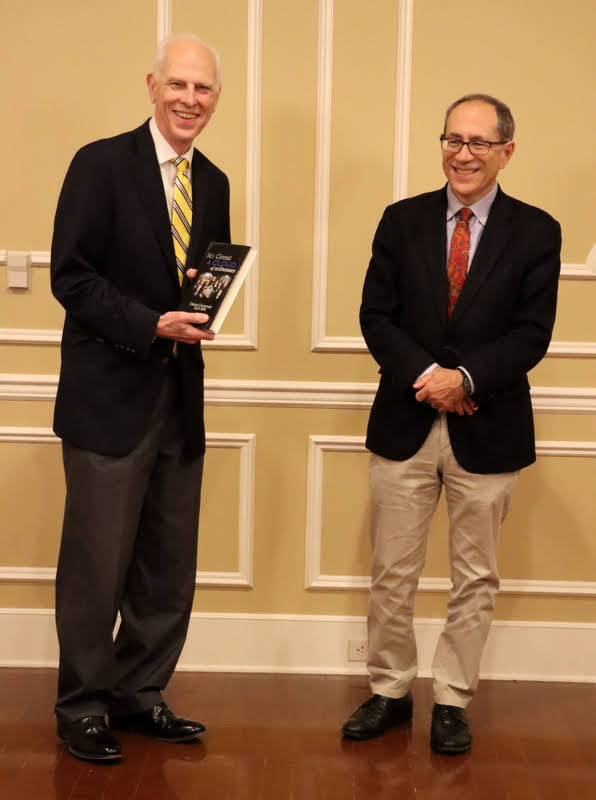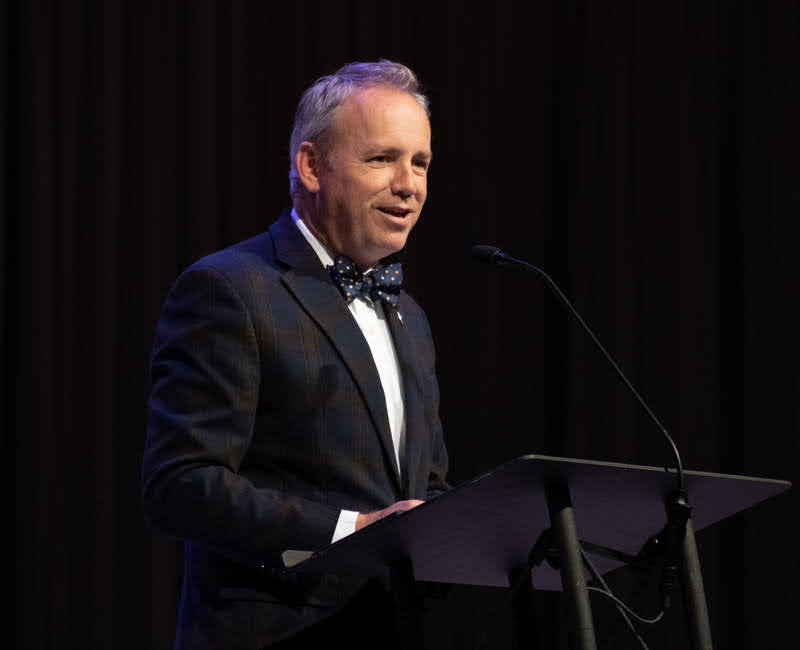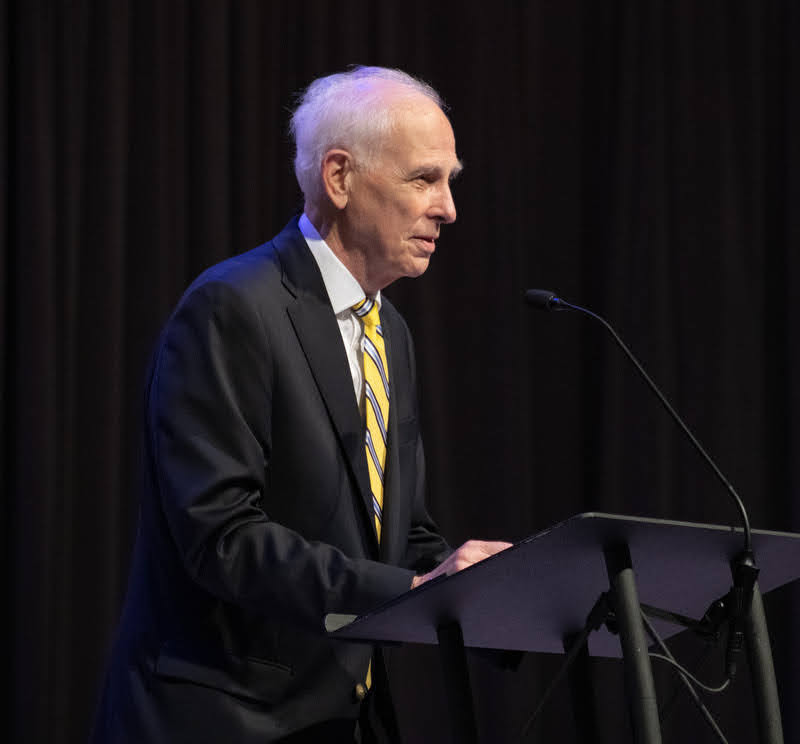Oct 25, 2021 - Dr. David A. Bell, the Sidney and Ruth Lapidus Professor in the Era of North Atlantic Revolutions at Princeton University, lectured twice about the eighteenth-century Western world on October 25 as the 2021 Carls-Schwerdfeger History Lecturer. A specialist of early modern France and Napoleon, Bell is a prize-winning author who has written six books and coauthored a seventh.
In the afternoon, Bell spoke about “Napoleon Bonaparte and the Origins of Modern Total War” to some 125 people. He explained how a major physical intensification in fighting wars occurred during the French Revolutionary and Napoleonic eras, when numerous battles were fought with increasingly large armies on the battlefield. Basic to his interpretation regarding the emergence of modern total war was a shift in the culture of war from that of the eighteenth-century to that of the Revolutionary and Napoleonic periods. During the Old Regime of the eighteenth century, virtually all military officers came from the aristocracy. Bell argued that their conduct in military campaigns was linked to the courtly values of aristocratic society generally. The officers demonstrated self-control, preferred campaigns of maneuver, fought battles infrequently, and saw war as an ordinary and unexceptional part of society. The code of honor practiced in military affairs demanded respect for civilian populations and the dynasties of enemy states. During the Radical Revolution in France in the 1790s, some Revolutionary leaders embraced eighteenth-century Enlightenment-related pacifism by arguing in favor of war to achieve perpetual peace. Their belief in a war to end all wars led them to consider their enemies as criminals deserving of destruction. Other Revolutionaries defended war by embracing an eighteenth-century concept that viewed war as a tool to regenerate or revitalize society. These two concepts about war continued through the Napoleonic years, with regenerative war expanding to include individuals finding regeneration and understanding of the self through extreme experience. Bell contended that Napoleon was perhaps the best example of a soldier wrestling with destiny, someone who repeatedly exposing himself to death and prevailed. War under Napoleon continued to radicalize, with the destruction of enemy armies and the overthrow of enemy regimes as the goals. What emerged is what we call total war. Although the victorious Allies over Napoleon attempted to put total war back into the bottle from which it sprang, they failed. The two concepts from which it developed – ending war altogether and regenerative war – continued to influence Western elites thereafter, opening the door to total war in the twentieth century.
Bell’s evening lecture, which 500 people attended, was on “George Washington, Napoleon Bonaparte, and the Power of Charisma in the Age of Revolution.” Bell focused much of his attention on the praise and adulation people felt for Washington during and after the American Revolutionary War and why that happened. John Adams, later America’s second president, expressed concern at the time that people were ready to “idolize” Washington and make him the object of “superstitious veneration.” Bell stated that Adams’ use of those terms was important, for they seemed to indicate that Washington was being viewed in colonial circles as a kind of “religious figure, maybe a golden calf of sorts.” To try to understand what was at work here, Bell turned to the concept of charisma that the German social scientist Max Weber applied to leaders whom people wanted to view as almost supernatural in some respects and to use as objects of worship. According to Bell, Washington’s charismatic reputation resulted from a new kind of charisma that the rapidly expanding print world of the eighteenth century created. While Washington was the foremost of them, he did have predecessors who in some ways prepared the way for him. The leading charismatic individual before Washington was the Corsican Pascale Paoli who ruled as the unchallenged commander-in-chief on the Mediterranean island of Corsica in the 1760s. Writers and politicians in the West, especially the British writer James Boswell, portrayed Paoli as a defender of liberty, lifted him to an almost supernatural status, and made him the most talked about individual in the Western world. Paoli was made into a celebrity as part of the phenomenon of celebrity culture that emerged with the rapidly growing eighteenth-century world of print. This turned out to be the case with Washington as well, with praise being heaped on him in the print media in America and Europe. They filled a need among the public for heroes with whom people could have a personal, direct, and emotional attachment and whom people could trust more than ordinary politicians. Bell noted that the genre of the eighteenth-century novel contributed to the shaping of people’s intense emotional relations toward charismatic leaders and their willingness to accept potentially complete subservience to them. Such attitudes basically allowed charismatic leaders to move beyond the rules if they chose to do so. Napoleon Bonaparte worked hard to promote himself as a charismatic leader with quasi-supernatural gifts and capitalized on his heroic military reputation to set up a despotic regime in France. In contrast to Napoleon, Washington, who could have set up a despotic regime based on his immense popularity among the American people, always resisted that temptation. He rejected despotic rule partly because of a desire to abide by the limits in the American Constitution, but even more so, according to Washington’s admirers, because of the limits that Washington imposed on himself. In so doing, Bell concluded, “Washington set a powerful example that generations of American politicians, however flawed, have understood, and I hope that continues.”
Bell’s other activities at Union included a coffee time with history department faculty members and a dinner in his honor in Union’s Chapman Dining Room.
 Dr. David Bell lectures on "Napoleon Bonaparte and the Emergence of Modern Total War" on the afternoon of October 25, 2021, in the Carl Grant Events Center at Union University.
Dr. David Bell lectures on "Napoleon Bonaparte and the Emergence of Modern Total War" on the afternoon of October 25, 2021, in the Carl Grant Events Center at Union University.
 Dr. David Bell relaxes during a coffee time with history department faculty members on the afternoon of October 25, 2021, at Union University.
Dr. David Bell relaxes during a coffee time with history department faculty members on the afternoon of October 25, 2021, at Union University.
 Princeton University historian Dr. David Bell (center) stands with Union University history department faculty members during a coffee time on October 25, 2021. The Union faculty members are (left to right) Drs. David Thomas, Henry Allen, Terry Lindley, and Keith Bates.
Princeton University historian Dr. David Bell (center) stands with Union University history department faculty members during a coffee time on October 25, 2021. The Union faculty members are (left to right) Drs. David Thomas, Henry Allen, Terry Lindley, and Keith Bates.
 Attendees at a dinner in honor of Dr. David Bell enjoy their meals in Union's Chapman Dining Room on October 25, 2021. At the front table in the photo are (left to right) Robert Briley, Colby Benefield, and Shane Lynch.
Attendees at a dinner in honor of Dr. David Bell enjoy their meals in Union's Chapman Dining Room on October 25, 2021. At the front table in the photo are (left to right) Robert Briley, Colby Benefield, and Shane Lynch.
 Dr. David Bell (left) stands with Union University President Dr. Samuel W. "Dub" Oliver after presenting him with a copy of his book MEN ON HORSEBACK at a dinner in Dr. Bell's honor on October 25, 2021.
Dr. David Bell (left) stands with Union University President Dr. Samuel W. "Dub" Oliver after presenting him with a copy of his book MEN ON HORSEBACK at a dinner in Dr. Bell's honor on October 25, 2021.
 Dr. Stephen Carls (left) presents a book to Dr. David Bell at a dinner in honor of the Princeton professor on October 25, 2021.
Dr. Stephen Carls (left) presents a book to Dr. David Bell at a dinner in honor of the Princeton professor on October 25, 2021.
 An audience of some 500 people gathers on the evening of October 25, 2021, to hear Dr. David Bell of Princeton University speak about "George Washington, Napoleon Bonaparte, and the Power of Charisma in the Age of Revolution." Seated in the foreground of the front row are (left to right) Union University President Dr. Samuel W. "Dub" Oliver, Dr. David Bell of Princeton University, and Dr. Benjamin Guyer of the University of Tennessee at Martin.
An audience of some 500 people gathers on the evening of October 25, 2021, to hear Dr. David Bell of Princeton University speak about "George Washington, Napoleon Bonaparte, and the Power of Charisma in the Age of Revolution." Seated in the foreground of the front row are (left to right) Union University President Dr. Samuel W. "Dub" Oliver, Dr. David Bell of Princeton University, and Dr. Benjamin Guyer of the University of Tennessee at Martin.
 Dr. Samuel W. "Dub" Oliver, President of Union University, welcomes attendees to the evening lecture of the Carls-Schwerdfeger History Lectureship in Union's G. M. Savage Memorial Chapel on October 25, 2021. Photo by Abigail Aspinwal
Dr. Samuel W. "Dub" Oliver, President of Union University, welcomes attendees to the evening lecture of the Carls-Schwerdfeger History Lectureship in Union's G. M. Savage Memorial Chapel on October 25, 2021. Photo by Abigail Aspinwal
 Dr. Stephen Carls introduces Dr. David Bell of Princeton University at the evening lecture of the 2021 Carls-Schwerdfeger History Lectureship on October 25. Photo by Abigail Aspinwal
Dr. Stephen Carls introduces Dr. David Bell of Princeton University at the evening lecture of the 2021 Carls-Schwerdfeger History Lectureship on October 25. Photo by Abigail Aspinwal
 Dr. David Bell of Princeton University talks about "George Washington, Napoleon Bonaparte, and the Power of Charisma in the Age of Revolution" on the evening of October 25 as the 2021 Carls-Schwerdfeger History Lecturer. Photo by Abigail Aspinwal
Dr. David Bell of Princeton University talks about "George Washington, Napoleon Bonaparte, and the Power of Charisma in the Age of Revolution" on the evening of October 25 as the 2021 Carls-Schwerdfeger History Lecturer. Photo by Abigail Aspinwal
 Robert Briley asks a question during the "Questions and Answers" time at the end of Dr. David Bell's evening lecture on October 25, 2021. Photo by Abigail Aspinwal
Robert Briley asks a question during the "Questions and Answers" time at the end of Dr. David Bell's evening lecture on October 25, 2021. Photo by Abigail Aspinwal
